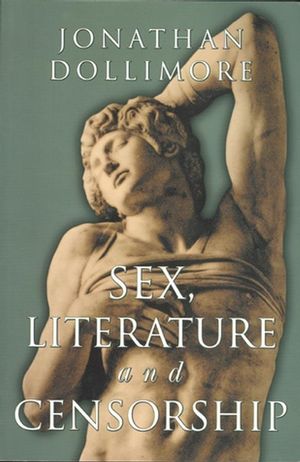Sex, Literature and CensorshipISBN: 978-0-7456-2763-2
Hardcover
224 pages
August 2001, Polity
 Other Available Formats: Paperback
|
||||||
‘No one grasps more fully than Jonathan Dollimore the
challenges, evasions and deceptions in the volatile theorizing of
identity and desire, past and present. His brilliant, theoretical
synthesis combines with graphic experiential and literary analysis
to render Sex, Literature and Censorship never less than
enthralling. Erudite, provocative and delightful to read, what more
could he do for us?' Lynne Segal, author of Why
Feminism?
‘Jonathan Dollimore's Sex, Literature and
Censorship continues his remarkably resonant inquiry into the
darker, defiant regions of the creative imagination. The ethical
aim of critical thinking, Dollimore provocatively suggests,
requires us to intervene in the corporate consensus of the culture
industry, and to resist the pedagogical etiquette of academia. He
argues that we must explore the daemonic power of those subjects
and objects that offend our tastes and traditions. We applaud and
oppose him, following the dialectical destiny of dissidence to
which he has skilfully introduced us.' Homi K. Bhabha, Harvard
University
'[A] feverish, political polemic.' Steven Poole, The
Guardian
'Dollimore speaks an important truth when he suggests that some
of the most compelling literature, past and present, hinges on the
tension between, if not the incompatibility of, "the ethical
conscience and the creative imagination".' The
Independent
'Looking at the contradictions of identity-based sexual politics
movements, [Dollimore] examines the ethics of knowledge and
practice that circulate around ideas of danger - dangers to the
self, dangerous knowledge - connecting these with questions posed
by art as a site of danger in itself.' Radical
Philosophy
'Sex, Literature, and Censorship is a book worth reading;
it says provocative things we will ponder long after setting it
down' Times Literary Supplement
'Biographical and autobiographical anecdote are one of the chief amusements of this book. Dollimore tells us of his first gay affair, his subsequent relationship with a woman, his particular sexual preferences. It is calculated to shock, performing the dissidence it preaches. Indeed, if I have criticism of the book, it is that it has nothing to say about the tenderness of sexual desire, but that probably reveals precisely how unradical i am.' Times Higher Education Supplement



